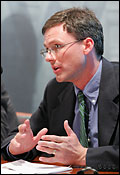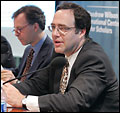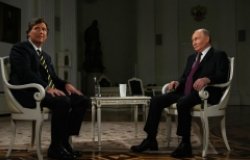Congress and U.S. Military Interventions
with Ryan Hendrickson, Eastern Illinois University; David Abramowitz, Democratic Chief Counsel, House International Relations Committee, and Robert Litwak, Woodrow Wilson Center
Overview

While most scholars agree that Congress has been highly deferential to presidents on foreign policy matters for the better part of the twentieth century, especially during times of war and international crises, it would be oversimplifying things to assume the president has always been the dominant and prevailing force in the struggle between the branches. When a president's military interventions abroad, for instance, don't go as well as expected, public opinion moves from support to opposition, and with it Congress becomes more emboldened in challenging the president and in influencing policy changes. This was true with President Lyndon Johnson's Vietnam war policy, and, we are beginning to see it now with President George W. Bush's Iraq policy, spurred in part by the prison abuse scandal.
These were some of the observations offered by panelists at the seminar on "Congress and U.S. Military Interventions Abroad" on May 17, cosponsored by the Wilson Center's Congress Project and the Division of International Studies. In addition to the directors of the two Center programs, Don Wolfensberger and Robert Litwak, the panel featured David Abramowitz, Democratic Chief Counsel to the House International Relations Committee, and Eastern Illinois University Associate Professor of Political Science, Ryan C. Hendrickson.
 Hendrickson, who presented a paper prepared for the seminar, "Clinton, Bush and War Powers: A Comparative Analysis of the Military Strikes on Iraq and Bin Laden," (download paper at right) found that President Clinton did not seek prior authority from Congress in the numerous air strikes against Iraq and Bin Laden during his presidency. And, while there was no prior notification or consultation with congressional leaders on the Iraq strikes, the president did at least consult Congress more in addressing the terrorist situation. President George W. Bush, on the other hand, while continuing with Clinton's policies in retaliating against Iraq for violations of the no-fly zone in the north, did seek authorization from Congress for both the "use of force" resolutions against the Taliban and al Qaeda in Afghanistan in September 2001, and against Iraq in October 2002. In both instances, however, Bush said he did not need such authority given his inherent authority as commander in chief as well as previous congressional authorizations. George H.W. Bush took the same position when he sought approval for the Gulf War in 1991, observed Hendrickson. Hendrickson is author of the book, The Clinton Wars: The Constitution, Congress and War Powers (Vanderbilt University Press, 2002). Hendrickson said the attempt by Congress in 1973 to rein in the presidential war-making tendencies by enacting the War Powers Resolution over President Nixon's veto, has largely been a failure due to Congress's reluctance to invoke it and the claim of every president since Nixon to claim that it is unconstitutional. Hendrickson concluded that the jury is still out on whether Congress will reassert itself to influence the Administration's Iraq policies. In large part, up to now, it has been true to the pattern of deference exhibited by past Congresses in similar situations.
Hendrickson, who presented a paper prepared for the seminar, "Clinton, Bush and War Powers: A Comparative Analysis of the Military Strikes on Iraq and Bin Laden," (download paper at right) found that President Clinton did not seek prior authority from Congress in the numerous air strikes against Iraq and Bin Laden during his presidency. And, while there was no prior notification or consultation with congressional leaders on the Iraq strikes, the president did at least consult Congress more in addressing the terrorist situation. President George W. Bush, on the other hand, while continuing with Clinton's policies in retaliating against Iraq for violations of the no-fly zone in the north, did seek authorization from Congress for both the "use of force" resolutions against the Taliban and al Qaeda in Afghanistan in September 2001, and against Iraq in October 2002. In both instances, however, Bush said he did not need such authority given his inherent authority as commander in chief as well as previous congressional authorizations. George H.W. Bush took the same position when he sought approval for the Gulf War in 1991, observed Hendrickson. Hendrickson is author of the book, The Clinton Wars: The Constitution, Congress and War Powers (Vanderbilt University Press, 2002). Hendrickson said the attempt by Congress in 1973 to rein in the presidential war-making tendencies by enacting the War Powers Resolution over President Nixon's veto, has largely been a failure due to Congress's reluctance to invoke it and the claim of every president since Nixon to claim that it is unconstitutional. Hendrickson concluded that the jury is still out on whether Congress will reassert itself to influence the Administration's Iraq policies. In large part, up to now, it has been true to the pattern of deference exhibited by past Congresses in similar situations.
 David Abramowitz, who asked that his remarks be off the record, helped to inform the seminar audience on the role of Congress in overseeing the executive on foreign and domestic issues, and how the part seen by the public, congressional oversight hearings, is only the tip of what actually goes on in the oversight interplay between the branches that often subtly influences policy. Abramowitz published an article in the Harvard International Law Journal in the Winter of 2002 titled, " The President, the Congress, and Use of Force: Legal and Political Considerations in Authorizing Use of Force Against International Terrorism," in which he discussed the involvement of congressional committee and party leaders in drafting the use of force resolution against terrorism in the aftermath of the September 11 attacks. Congress insisted on making changes in a much broader authority requested in the president's draft resolution. Similar changes were made in the Iraq use of force resolution in October 2002 at the insistence of congressional leaders.
David Abramowitz, who asked that his remarks be off the record, helped to inform the seminar audience on the role of Congress in overseeing the executive on foreign and domestic issues, and how the part seen by the public, congressional oversight hearings, is only the tip of what actually goes on in the oversight interplay between the branches that often subtly influences policy. Abramowitz published an article in the Harvard International Law Journal in the Winter of 2002 titled, " The President, the Congress, and Use of Force: Legal and Political Considerations in Authorizing Use of Force Against International Terrorism," in which he discussed the involvement of congressional committee and party leaders in drafting the use of force resolution against terrorism in the aftermath of the September 11 attacks. Congress insisted on making changes in a much broader authority requested in the president's draft resolution. Similar changes were made in the Iraq use of force resolution in October 2002 at the insistence of congressional leaders.
Robert Litwak, author of Rogue States and U.S. Foreign Policy: Containment After the Cold War (Johns Hopkins University Press, 2000), observed that while every foreign intervention is different, the overall pattern of congressional deference to the president is similar, dating back to the founding of the Republic. Litwak said Americans have always been of two minds on how it should assert itself in the world—-the realist or pragmatic school that looks at the distribution of power between nations, and the liberal school or Wilsonians who look at the internal organization of states and see the proliferation of democracy and free markets as the answer to producing peace and stability. Our foreign policy has usually been a blend of these two schools, but with one more dominant than the other under various presidents. While George W. Bush campaigned as a realist, eschewing "nation building," September 11 changed all that as we entered a new age of instability. Now the administration is committed to establishing peace and stability through the promotion of democracy around the world. The dominant neo-conservatives in the Administration are a strain of the Wilson school, the difference being that they do not see international institutions and treaties as central to carrying out the mission of changing the world. While traditional conservatives forged an uneasy alliance with the neo-conservatives in backing the president, the strains between the various camps are beginning to show as things have not worked out as well as the optimists had projected. Litwak agreed with other panelists that while deference to the president will continue to be the overall attitude of Congress towards a president's foreign policy, this can shift suddenly to assertiveness or even defiance, as past history has demonstrated.
Thank you for your interest in this event. Please send any feedback or questions to our Events staff.










